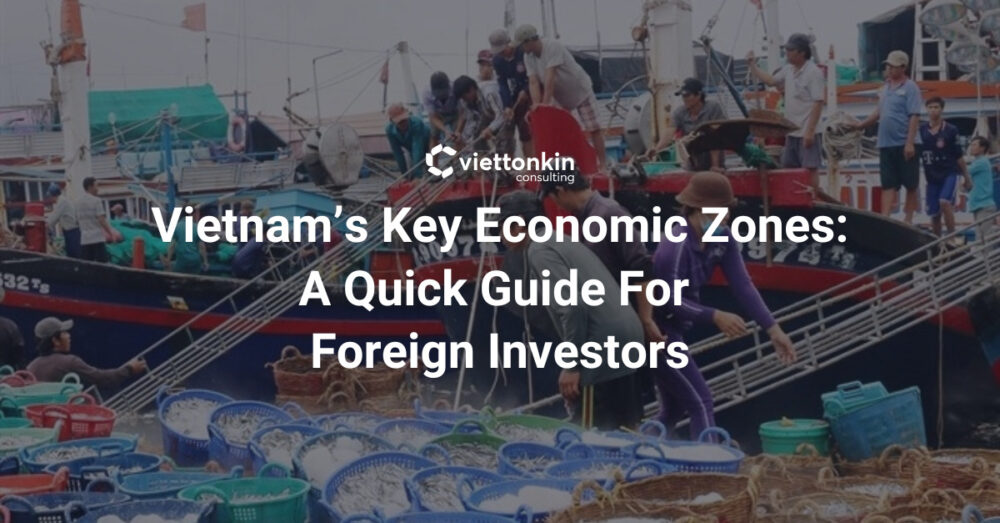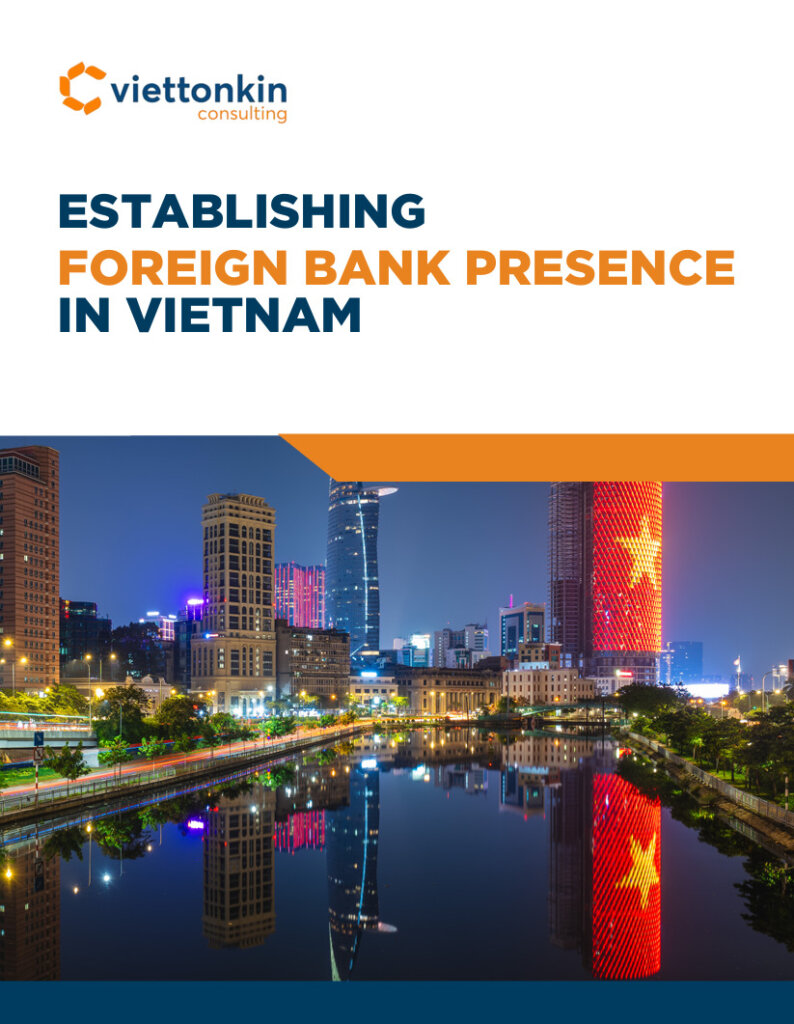Vietnam's food trade industry is one of the most dynamic sectors in the country. Fueled by an expanding middle class, rising disposable incomes, and shifting consumer preferences, the increasing demand for high-quality food products is undeniable. From bustling markets in Ho Chi Minh City to modern supermarkets in other major cities, the opportunity for both […]
Ever since it was first implemented in 1997, the classification of key economic zones (KEZs) in Vietnam has provided many development opportunities and socio-economic boosts for different regions in the country to thrive. Moreover, the incentives and support provided by the Government and local authorities towards the development of the KEZs have in turn attracted investments from foreign businesses and individuals, creating distinctive competitiveness for each zone.
What Are Key Economic Zones?
According to the Portal of the Ministry of Planning and Investment (MPI), the Communist Party of Vietnam and the State have identified key economic zones as the driving force of the country, attracting the development of other regions throughout the country. A key economic zone is an area that possesses the best conditions for development and is capable of creating competitive advantages.
From the time of its initial implementation at the end of 1997 until the present, Vietnam's key economic zone model has received special attention from the government and ministries as well as foreign investment. As a result, the country’s KEZs have expanded from 3 regions and 13 provinces and cities directly under the central government to a total of 4 regions and 24 provinces and cities directly under the central government.
With a population that makes up 51% of the country, Vietnam's key economic zones cover a total of over 90,000 km2 (or 27.4% of the country's area). The Southern KEZ is the largest of the four KEZs, covering an area of over 30,585 km2. The Central KEZ is next (over 27,900 km2), followed by the Mekong Delta (over 16,600 km2), and the Northern KEZ (over 15,590 km2).
Current Situation

According to a report from the Ministry of Planning and Investment, the Gross Domestic Product (GRDP) of the four KEZs increased by an average of 7.25% per year between 2011 and 2019. The proportion of the GRDP of all 24 localities in 4 KEZs to the GDP of the entire country was greater than 70%. The two major growth centers of the nation, Hanoi and Ho Chi Minh City, helped the average annual growth of the entire nation between 2011 and 2019 reach 13.08% and 19.9%, respectively. In addition, a study shows that every 1% growth of the four KEZs will increase the GDP of the entire economy by 0.61%, of which the Northern and Southern KEZs are the two regions with the greatest impact.
But in the opinion of experts, the benefits of key economic zones have not been fully promoted to create a true driving force for national growth. In most cases, the infrastructure is insufficient, and the connections between the localities are not coordinated. The KEZs still don't have a sense of sustainable development, and the quality of urban development is still poor.
Each zone has its own characteristics that create inner strength to improve the region's competitiveness. While the Northern KEZ focuses on industrial development, the Southern KEZ focuses on developing the service sector. However, in general, they still tend to develop within quite similar and overlapping frameworks, without specialized assignments to realize economic sector linkages.
Open Doors for Foreign Investment
With their focused benefits and support, Vietnam’s key economic zones are considered to be magnets for foreign direct investment (FDI). Foreign investors are more willing to start their FDI projects in KEZs to take advantage of the incentives, abundant opportunities, and huge infrastructure.
Due to the unique regional characteristics that give rise to each KEZ's distinct industry development orientation, businesses and investment funds will have more time to thoroughly investigate, contrast, and ultimately decide on the most advantageous opportunities for their ventures in Vietnam.
The Southern KEZ is known for its policies of attracting investments in knowledge-based and high-tech industries and services and is a recognized zone for advanced manufacturing. Electronics, software, IT, telecom, and high-tech agriculture production and processing are some of the key industries that will drive future investment for the Southern KEZ. The most significant financial and trading center in the nation, Ho Chi Minh City, places a strong emphasis on service industries like finance, logistics, tourism, healthcare, and education.
On the other hand, the economic structure of the Northern KEZ has gradually shifted toward industrialization. In accordance with Resolution No. 128/NP-CP, the Northern KEZ concentrates on luring investments from financial banking, specialized medical, and supporting industries, as well as high-tech industries and high-tech services. The improvement and expansion of major international container ports in the Northern KEZ have boosted the area's competitiveness with the Southern KEZ and helped the logistics industry grow.
Compared to the Northern and Southern KEZs, the Central KEZ is weaker in terms of infrastructure and human resources but has greater potential thanks to a large transhipment port, the development of resort tourism, and many world heritage sites. The Central KEZ is less developed in terms of infrastructure and human resources than the Northern and Southern KEZs, but it has more potential because of a sizable transhipment port, the growth of resort tourism, and numerous world heritage sites. Additionally, the zone has potential for the growth of the shipbuilding sector and maritime services. With lower investment costs than in other zones, the Central KEZ has become an attractive destination for both domestic and international investors. The Central KEZ has become a desirable location for both domestic and foreign investors due to lower investment costs than in other zones.
Finally, localities in the Mekong Delta KEZ have made significant improvements to their economic governance and business environment over the years with their unceasing efforts. The zone aims to focus on developing hi-tech agriculture, the agriculture processing industry, and tourism on Phu Quoc Island as well as efficiently implementing measures to promote the sustainable development of the region in line with coping with climate change.
As KEZ's infrastructure system is strongly backed by the Vietnamese government's framework and public-private partnership (PPP) stance, investing in its development is a popular choice for foreign investors. The long-awaited Law on Public-Private Partnership (PPP Law), which creates a general legal framework for all PPP projects and seeks to increase private investment in the construction of Vietnam's infrastructure, was approved by the National Assembly of Vietnam on June 18, 2020. While only time may tell if the PPP Law can truly bring significant results to the infrastructure scene in Vietnam, experts have pointed out positive changes under the Law with respect to making the PPP framework more appealing.
The private developer, investor, and lending communities are likely to welcome the clarification of the investment procedures for PPP projects, particularly the investor selection process, the relaxation of the private sector equity capital contribution requirements, and the introduction of revenue sharing and revenue support mechanisms.
Public investment is a key component of the post-pandemic recovery and is expected to be targeted at infrastructure assets that increase intra-regional connectivity. Going forward, it is also expected that foreign capital’s participation in these projects is likely to increase, and opportunities for public-private partnerships could attract foreign firms into sectors such as transport and infrastructure. In 2019, Vietnam introduced the Law on Public Investment, which is expected to accelerate decentralization, increase accountability, and contribute to higher efficiency in public investment. In addition, public investment is a key component of the MPI’s Socioeconomic Development Plan 2021-2025.
The Ministry of Planning and Investment and the Ministry of Finance are expected to draft a number of decrees aimed at putting the PPP Law into effect in the best possible way. Furthermore, the Prime Minister and the Government have issued several Decisions on the implementation of master plans on the socio-economic development of all key economic zones through 2020. Included in these Decisions are also a list of programs and projects prioritized for investment study for each KEZ. More information about the lists can be found here.
Conclusion
For foreign investors, Vietnam has emerged as an important investment destination. With a strong GDP and favorable investment conditions, selecting the best location for your operations is critical. Vietnam now offers four key economic zones for businesses to choose from, each with its own challenges and rewards. To choose the right KEZ will be to receive abundant incentives and support from the Government that ensure a leading advantage in the market for new businesses.
With over 12 years of experience in the investment consulting industry, Viettonkin is confident in providing the best solutions to our international clients, establishing ourselves as the trusted local partner that all foreign investors seek. Contact us right away and our experts will gladly assist you.












